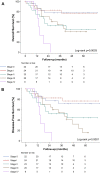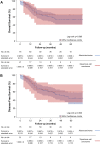Long-term survival outcomes of esophageal cancer after minimally invasive Ivor Lewis esophagectomy
- PMID: 35209914
- PMCID: PMC8876443
- DOI: 10.1186/s12957-022-02518-0
Long-term survival outcomes of esophageal cancer after minimally invasive Ivor Lewis esophagectomy
Abstract
Objectives: The aim of this study was to determine the long-term overall and disease-free survival and factors associated with overall survival in patients with esophageal cancer undergoing a totally minimally invasive Ivor Lewis esophagectomy (MILE) at a safety-net hospital.
Methods: This was a single-center retrospective review of consecutive patients who underwent MILE from September 2013 to November 2017. Overall and disease-free survival were analyzed by Kaplan-Meier estimates, and hazard ratios (HR) were derived from multivariable Cox regression models.
Results: Ninety-six patients underwent MILE during the study period. Overall survival at 1, 3, and 5 years was 83.2%, 61.9%, and 55.9%, respectively. Disease-free survival at 1, 3, and 5 years was 83.2%, 60.6%, and 47.5%, respectively. Overall survival (p < 0.001) and disease-free survival (p < 0.001) differed across pathological stages. By multivariable analysis, increasing age (HR, 1.06; p = 0.02), decreasing Karnofsky performance status score (HR, 0.94; p = 0.002), presence of stage IV disease (HR, 5.62; p = 0.002), locoregional recurrence (HR, 2.94; p = 0.03), and distant recurrence (HR, 4.78; p < 0.001) were negatively associated with overall survival. Overall survival significantly declined within 2 years and was independently associated with stage IV disease (HR, 3.29; p = 0.04) and distant recurrence (HR, 5.78; p < 0.001).
Conclusion: MILE offers favorable long-term overall and disease-free survival outcomes. Age, Karnofsky performance status score, stage IV, and disease recurrence are shown to be prognostic factors of overall survival. Prospective studies comparing long-term outcomes after different MIE approaches are warranted to validate survival outcomes after MILE.
Keywords: Cancer survival; Esophageal malignancy; Ivor Lewis esophagectomy; Thoracic surgery; Thoracolaparoscopic esophagectomy.
© 2022. The Author(s).
Conflict of interest statement
The authors declare that they have no competing interests.
Figures




References
-
- Biere SS, van Berge Henegouwen MI, Maas KW, Bonavina L, Rosman C, Garcia JR, et al. Minimally invasive versus open oesophagectomy for patients with oesophageal cancer: a multicentre, open-label, randomised controlled trial. Lancet. 2012;379:1887–1892. doi: 10.1016/S0140-6736(12)60516-9. - DOI - PubMed
Publication types
MeSH terms
Grants and funding
LinkOut - more resources
Full Text Sources
Medical

